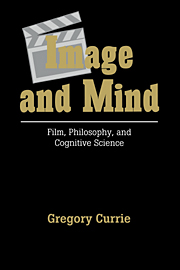Book contents
- Frontmatter
- Contents
- Preface
- Acknowledgements
- Film, 1895–1995
- Image and mind
- Introduction: the essence of cinema
- Part I Representation in film
- Part II Imagination
- Chapter 5 Imagination, the general theory
- Chapter 6 Imagination, personal and impersonal
- Chapter 7 Travels in narrative time
- Part III Interpretation
- In conclusion
- Named propositions
- Bibliography
- Index
Chapter 5 - Imagination, the general theory
Published online by Cambridge University Press: 28 October 2009
- Frontmatter
- Contents
- Preface
- Acknowledgements
- Film, 1895–1995
- Image and mind
- Introduction: the essence of cinema
- Part I Representation in film
- Part II Imagination
- Chapter 5 Imagination, the general theory
- Chapter 6 Imagination, personal and impersonal
- Chapter 7 Travels in narrative time
- Part III Interpretation
- In conclusion
- Named propositions
- Bibliography
- Index
Summary
Imagination, without inducing the experience I imagine, delivers the fruits of experience.
Richard WollheimI have argued that it is a mistake to suppose that fictions, cinematic and other, create an illusion of reality. Fictions, I will argue, appeal not to belief, but to the faculty of imagination. We shall see that I mean talk of a faculty quite literally here. The imagination I believe to be a purpose-built system within the mind, and one subject to selective damage in the way that vision and the components of vision are.
Imagination has been low on the agenda of recent analytic philosophy, perhaps on account of its presumed frivolity. Possibly by way of a reaction, the philosophical writing we have on the imagination has often been driven by a concern with psychopathology, certainly evident in the work of Wollheim, and in the otherwise very different (and generally less rewarding) work of film theorists influenced by Lacan. We need a psychopathology of imagination. But if we seek a naturalistic, biological explanation of imagination, we cannot rest with psychopathology; it is hardly credible that so complex and subtle a mechanism as the imagination should have developed and been sustained if it served no positive purpose. So we need an account of what is sometimes called the proper functioning of imagination: a biologically oriented theory that explains the adaptive benefit we gain from having the capacity to imagine.
- Type
- Chapter
- Information
- Image and MindFilm, Philosophy and Cognitive Science, pp. 141 - 163Publisher: Cambridge University PressPrint publication year: 1995



